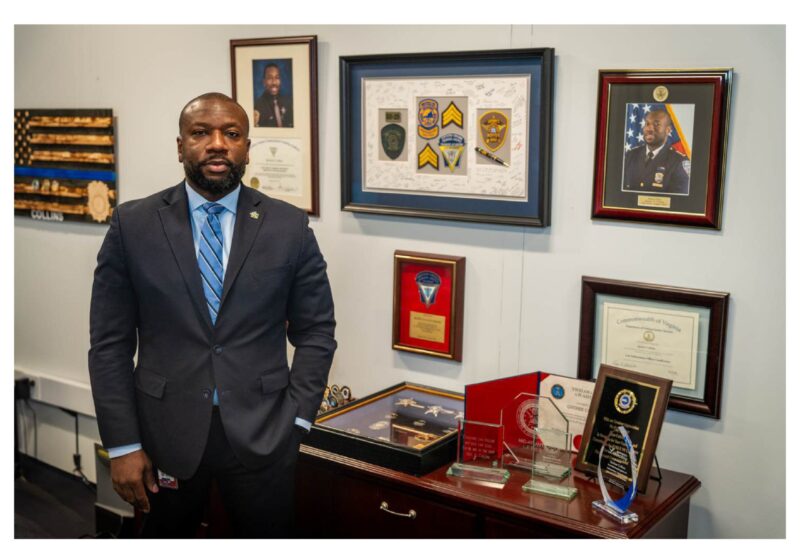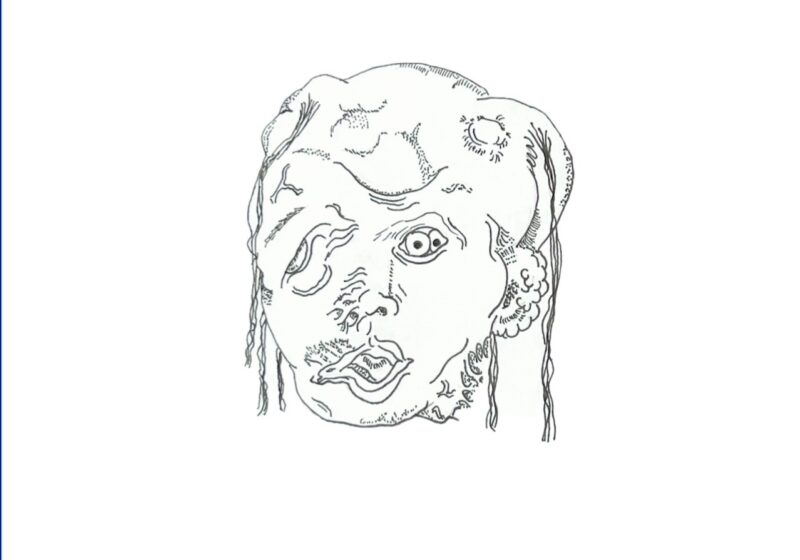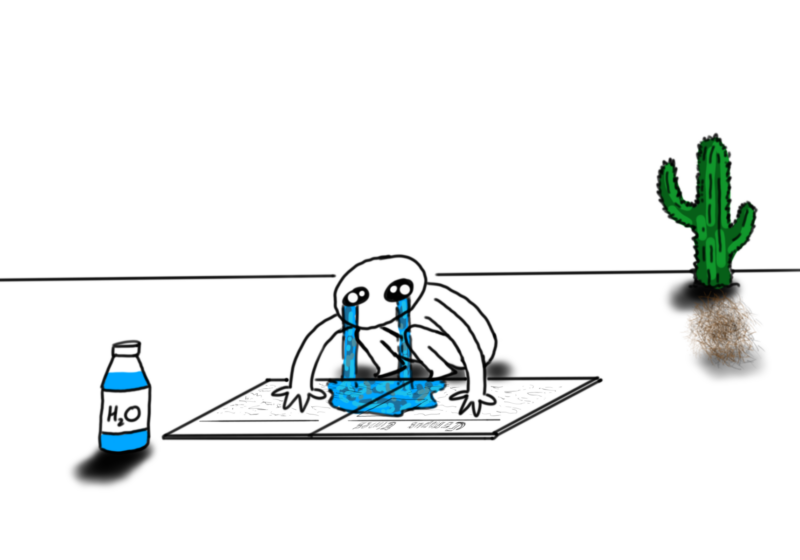In May, the University announced the appointment of Quchee Collins as both the inaugural Associate Vice President for the Department of Public Safety (DPS) and Chief Public Safety Officer.
With extensive experience as the deputy director for public safety at CUNY and the police chief for New York City’s Department of Citywide Administrative Services, Collins’ hire marks not only the University’s continued efforts to strengthen the capabilities of campus safety, but a new influence on how security is conducted on and around campus.
The Campus Times had the opportunity to sit down with Chief Collins regarding his experience at Rochester and how he envisions his role in shaping Rochester’s security.
On background and identity
As the deputy director for CUNY, Collins has led over 1,000 sworn and civilian personnel, representing 243,000 students and 52,500 employees.
Can you talk about what that responsibility holds — what it means to command such an operation, and how that experience has shaped you throughout your career?
“Working out of a central office as a university deputy director and reporting to my executive director was career changing for me in several ways. Number one: It’s an awesome responsibility.
[These students] are individuals who come [from and outside] the city of New York, who are pursuing their academic endeavors in a city that is diverse and different in each borough.
Understanding that there are different needs for different areas, and different needs for different populations of students […] I never lost the opportunity to just reflect on how critical the work we were doing there was. Specifically, what I did there was building community relationships, executing on the five-year strategic plan, identifying resources and capabilities, providing training to both the officers and the larger community, [and] dialing in on and improving our posture with Clery.”
The Clery Act requires colleges and universities to publicly disclose their annual crime reporting, which the University has complied with long before Collins’ hire.
How do you define your approach to campus security?
“I think campus public safety is a unique area within the public safety realm that has the opportunity to get community engagement correct, in that the University is really catered around the student experience […] These universities […] are almost like their own small towns.
During that time, [students are] forming their own thought processes about the world around them, how things can be and how things maybe should be. It’s a great opportunity to really dive into what the community is asking for and to demonstrate our competence in getting the job done.
What drew me to the University, quite honestly, was the story and the leadership […] In terms of [the motto], ‘Meliora,’ my entire career has been dedicated to process improvement. To have that sort of window into where the University is going through President Mangelsdorf’s leadership, and that concept of ‘one University,’ it almost fits perfectly with my idea about how a university could operate best, and what it can be.”
On crime in and around campus
As of writing, the Rochester Police Department (RPD) has reported over 1,500 cases of motor vehicle theft in the city.
Though this is a considerable decline from last year’s peak of nearly 4,000 thefts, the metric is a 253% increase from 2022’s count — and correlates with a spike in DPS reporting, with 26 car thefts reported in 2023.
To combat this, the department has offered steering wheel locks free of charge to Kia and Hyundai owners, who are most at risk due to the models’ lack of anti-theft immobilizers.
Are there further measures that can be tackled by campus security to address that kind of issue? Do you view it as a black-and-white issue, or endemic in nature?
“First, allow me to say that when I saw the rates of car vandalism and car thefts here, my first thought was to the victims. Folks are coming here to learn [and] pursue their academic endeavors, and the last thing they want to worry about is someone breaking into their car and stealing their goods. There’s a psychological impact to that as well as a cost impact for students.
After evaluating the data myself, we discovered some trends and decided to develop an operation behind that. What will be happening in the next couple of weeks is Operation ParkSafe will be initiated.
What that’ll do [is] deploy DPS resources to parking lots. Now, there are long-term solutions like security technology that could be helpful. We obviously want to continue to give our wheel locks, and give safety advice and tips to our campus community, because we do see that impact.
It’s just never a good situation when you see folks that would not expect that to happen to them, and then they become victims.”
Reports of students facing threats of burglary, assault, and other dangers have become more prevalent in recent years — with a Ph.D. student being assaulted near campus on Sept. 19.
The University currently employs over 200 blue light systems around campus — but when it comes to surveillance, are there any changes you’d like to make?
“There are some solutions that I would like to see, but they involve also getting a good read from the community about what is appropriate to this University’s culture. While I can’t go into specifics, what I will say is this is another thing of high concern […] It’s the last thing we want to happen on our campus.”
Newly present on the University’s Clery report were seven reported instances of hate crimes in 2023 — with none reported in the two prior years.
Have you had any experience dealing with something like this — and how do you highlight instances of discrimination as they pertain to campus?
“I’ll speak briefly about CUNY. It’s well-documented that there was a rise in antisemitic and other hate crimes at CUNY over my tenure there, and so I do have a lot of experience with responding to hate crimes.
I think it’s important to know that our response to hate crimes is one avenue, whereas what we are doing to inform [and build relationships with] the community [is another], so that they’re aware of the impact of it. I’m happy to announce that we’ve promoted Captain Jackie Shuman to captain over community engagement, who’ll be helping to tackle some of these things.
This is the responsibility of information and bringing awareness to these sorts of incidents, because they have real impact on real people. It’s not something that can be undertaken by DPS alone. It really takes the campus community to roll their sleeves up along with us and see how we can resolve some of these issues.”
On the influence and capability DPS holds
In previous years, efforts have been made by DPS members to extend the jurisdiction of armed officers; whether it be increasing the number of peace officers who carry arms, or allowing them to be armed across all campuses — not just their present location at the University’s Medical Center.
With regards to understanding that there are areas of campus and of the community that students may view as being served by the RPD — is there a balance between what DPS is effectively equipped to handle versus what RPD can?
“In terms of our partners, we have memorandums of understanding with all our local partners. That tradition is going to continue under my administration.
In terms of the armed officer contingent, what I think is important to highlight is that there are two job categories […] One is the unarmed, non-sworn public safety officer. These individuals you’ll see in sort of gray polo uniforms, and they essentially provide a security-only and customer-focused response to the security needs — and then we do have law enforcement-trained peace officers that are certified by the state. These individuals undergo rigorous training equal to that of their police counterparts, and exceeding in terms of University-specific training.
When we talk about expanding the arming, it’s important to understand that you’re going to have a hybrid Department of Public Safety that serves everyone’s interests, including law enforcement when and where necessary […] If we look at the five-point plan for public safety, that’s one of the things that I’m really excited about the opportunity of exploring.
I think there’s a lot of misunderstanding on all sides about the actual policy [and] what it actually states, and I’m looking forward to those conversations [and] the opportunity to clear that up.”
Last semester, the events of the Gaza solidarity encampment — including two sit-ins at Wallis Hall and a six-week presence on the Eastman Quad — raised a variety of concerns for existing security. With these events leaving a sour taste in the mouths of students, there have been ample concerns about the role security personnel hold over campus.
How do you work to balance those concerns with the responsibilities you hold?
“While I can’t adjudicate what happened on this specific campus last semester, what I can tell you is that it has been a primary focus of mine to ensure that we have strong relationships with our students, our faculty, and our staff. What that essentially means is going to spaces where we can be invited, and having real discussions about what public safety is doing to specifically provide safety consistently across the board for all groups.
What makes this University one of the best in the nation is because of the diversity that congregates here — but we have to be consistent […] Captain Jackie Shuman [has been] a phenomenal leader in this space […] Captain Joe Reed has been a staple for the Department of Public Safety over the last decade or two, and Lieutenant Tom Andreano has also been heavily involved in our community engagement over the years.
We've developed some real sound strategies to really go back into spaces and reintroduce ourselves to who we are today […] We may not always agree, but having the ability to engage with someone who at least respects your point of view is critical these days.”
What do you say to students who might not understand the work that you do, and what would you like to say to the student body as a whole?
“Everyone comes from different lived experiences. Some lived experiences would suggest [that] no matter how sincere, how transparent, and how collaborative I am towards you […] You will never appreciate the role of law enforcement — and that’s all right. You may never like law enforcement or public safety, and that’s okay.
What I would like for, at least, is to get to a mutual footing where we respect what each other does in our space and why we’re here at the University of Rochester. What I can show you is consistent leadership. I can show a department that is a part of the community […] Real individuals with families, with aspirations, with children.
The community empowers us with the trust that you give us. It’s our job not to violate that trust.”








